Accounting Issues in Corporate Collapse: Revenue Recognition, Debt, Operating Cash Flows, Earning Management
VerifiedAdded on 2023/01/19
|9
|1393
|77
AI Summary
This document discusses the accounting issues that contribute to corporate collapse, focusing on revenue recognition, debt, operating cash flows, and earning management. It explores the impact of these issues on financial reporting and investor confidence. The case study of ABC acquisition in Australia is used as an example.
Contribute Materials
Your contribution can guide someone’s learning journey. Share your
documents today.

1
Name:
Course
Professor’s name
University name
City, State
Date of submission
Name:
Course
Professor’s name
University name
City, State
Date of submission
Secure Best Marks with AI Grader
Need help grading? Try our AI Grader for instant feedback on your assignments.
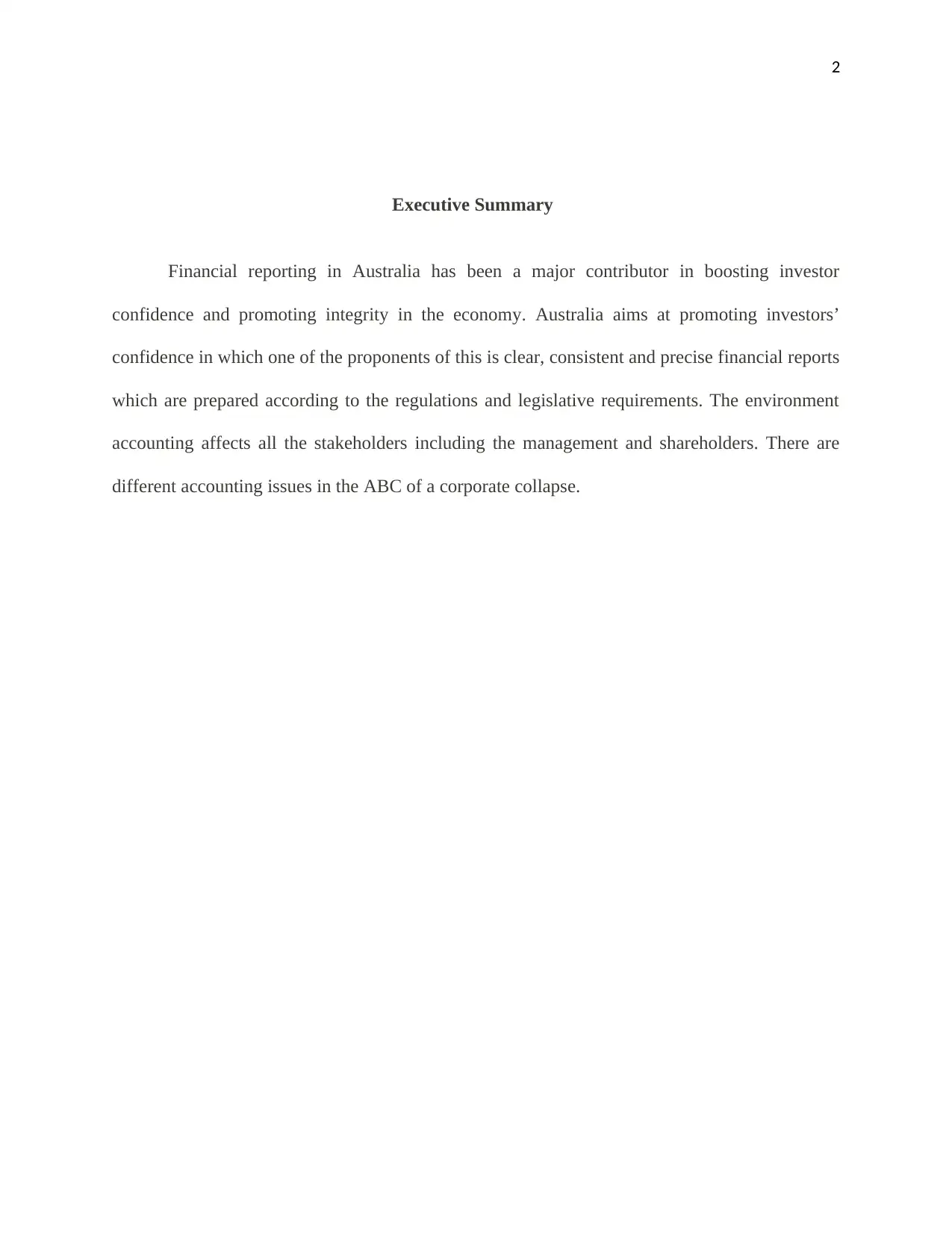
2
Executive Summary
Financial reporting in Australia has been a major contributor in boosting investor
confidence and promoting integrity in the economy. Australia aims at promoting investors’
confidence in which one of the proponents of this is clear, consistent and precise financial reports
which are prepared according to the regulations and legislative requirements. The environment
accounting affects all the stakeholders including the management and shareholders. There are
different accounting issues in the ABC of a corporate collapse.
Executive Summary
Financial reporting in Australia has been a major contributor in boosting investor
confidence and promoting integrity in the economy. Australia aims at promoting investors’
confidence in which one of the proponents of this is clear, consistent and precise financial reports
which are prepared according to the regulations and legislative requirements. The environment
accounting affects all the stakeholders including the management and shareholders. There are
different accounting issues in the ABC of a corporate collapse.
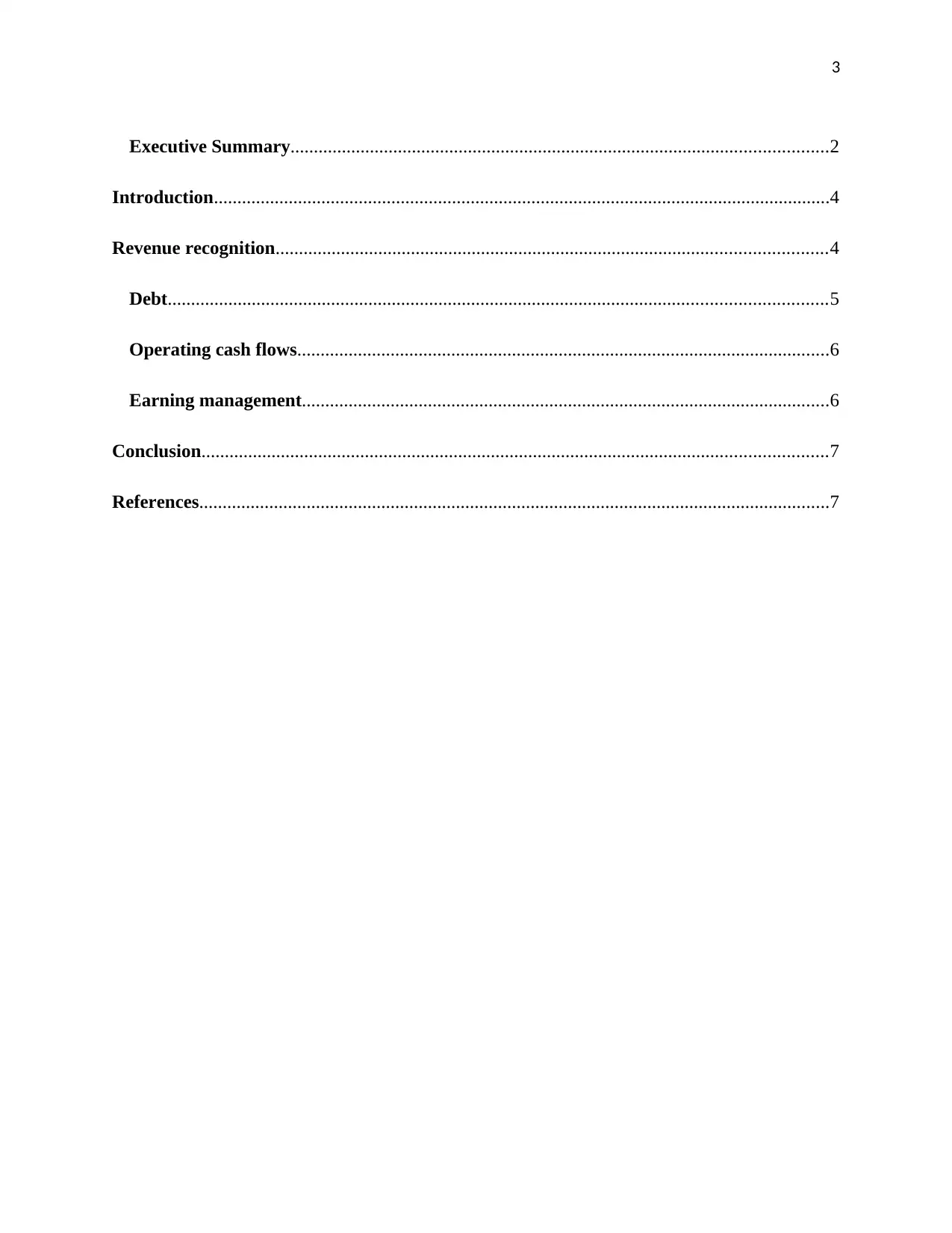
3
Executive Summary...................................................................................................................2
Introduction....................................................................................................................................4
Revenue recognition......................................................................................................................4
Debt.............................................................................................................................................5
Operating cash flows..................................................................................................................6
Earning management.................................................................................................................6
Conclusion......................................................................................................................................7
References.......................................................................................................................................7
Executive Summary...................................................................................................................2
Introduction....................................................................................................................................4
Revenue recognition......................................................................................................................4
Debt.............................................................................................................................................5
Operating cash flows..................................................................................................................6
Earning management.................................................................................................................6
Conclusion......................................................................................................................................7
References.......................................................................................................................................7
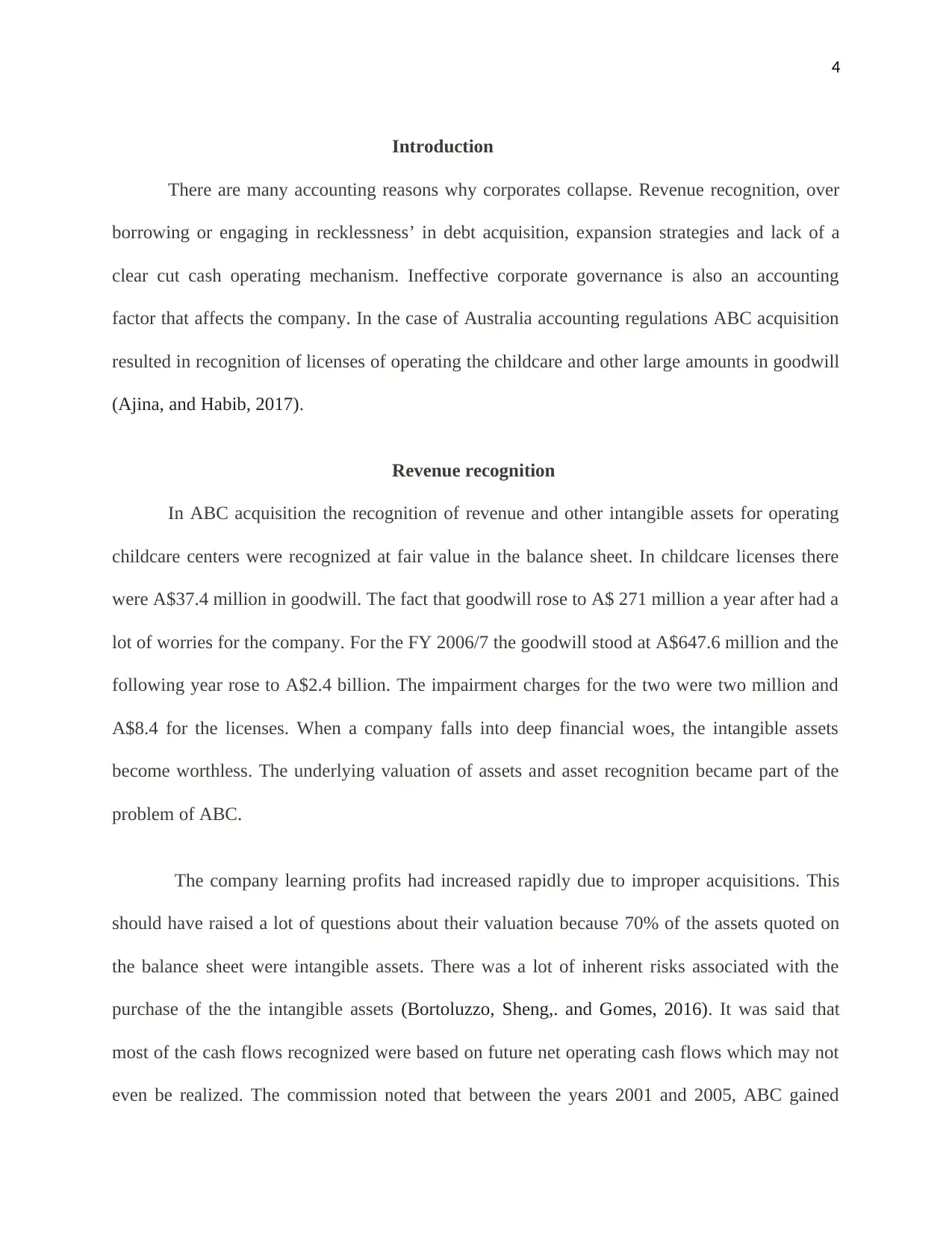
4
Introduction
There are many accounting reasons why corporates collapse. Revenue recognition, over
borrowing or engaging in recklessness’ in debt acquisition, expansion strategies and lack of a
clear cut cash operating mechanism. Ineffective corporate governance is also an accounting
factor that affects the company. In the case of Australia accounting regulations ABC acquisition
resulted in recognition of licenses of operating the childcare and other large amounts in goodwill
(Ajina, and Habib, 2017).
Revenue recognition
In ABC acquisition the recognition of revenue and other intangible assets for operating
childcare centers were recognized at fair value in the balance sheet. In childcare licenses there
were A$37.4 million in goodwill. The fact that goodwill rose to A$ 271 million a year after had a
lot of worries for the company. For the FY 2006/7 the goodwill stood at A$647.6 million and the
following year rose to A$2.4 billion. The impairment charges for the two were two million and
A$8.4 for the licenses. When a company falls into deep financial woes, the intangible assets
become worthless. The underlying valuation of assets and asset recognition became part of the
problem of ABC.
The company learning profits had increased rapidly due to improper acquisitions. This
should have raised a lot of questions about their valuation because 70% of the assets quoted on
the balance sheet were intangible assets. There was a lot of inherent risks associated with the
purchase of the the intangible assets (Bortoluzzo, Sheng,. and Gomes, 2016). It was said that
most of the cash flows recognized were based on future net operating cash flows which may not
even be realized. The commission noted that between the years 2001 and 2005, ABC gained
Introduction
There are many accounting reasons why corporates collapse. Revenue recognition, over
borrowing or engaging in recklessness’ in debt acquisition, expansion strategies and lack of a
clear cut cash operating mechanism. Ineffective corporate governance is also an accounting
factor that affects the company. In the case of Australia accounting regulations ABC acquisition
resulted in recognition of licenses of operating the childcare and other large amounts in goodwill
(Ajina, and Habib, 2017).
Revenue recognition
In ABC acquisition the recognition of revenue and other intangible assets for operating
childcare centers were recognized at fair value in the balance sheet. In childcare licenses there
were A$37.4 million in goodwill. The fact that goodwill rose to A$ 271 million a year after had a
lot of worries for the company. For the FY 2006/7 the goodwill stood at A$647.6 million and the
following year rose to A$2.4 billion. The impairment charges for the two were two million and
A$8.4 for the licenses. When a company falls into deep financial woes, the intangible assets
become worthless. The underlying valuation of assets and asset recognition became part of the
problem of ABC.
The company learning profits had increased rapidly due to improper acquisitions. This
should have raised a lot of questions about their valuation because 70% of the assets quoted on
the balance sheet were intangible assets. There was a lot of inherent risks associated with the
purchase of the the intangible assets (Bortoluzzo, Sheng,. and Gomes, 2016). It was said that
most of the cash flows recognized were based on future net operating cash flows which may not
even be realized. The commission noted that between the years 2001 and 2005, ABC gained
Secure Best Marks with AI Grader
Need help grading? Try our AI Grader for instant feedback on your assignments.
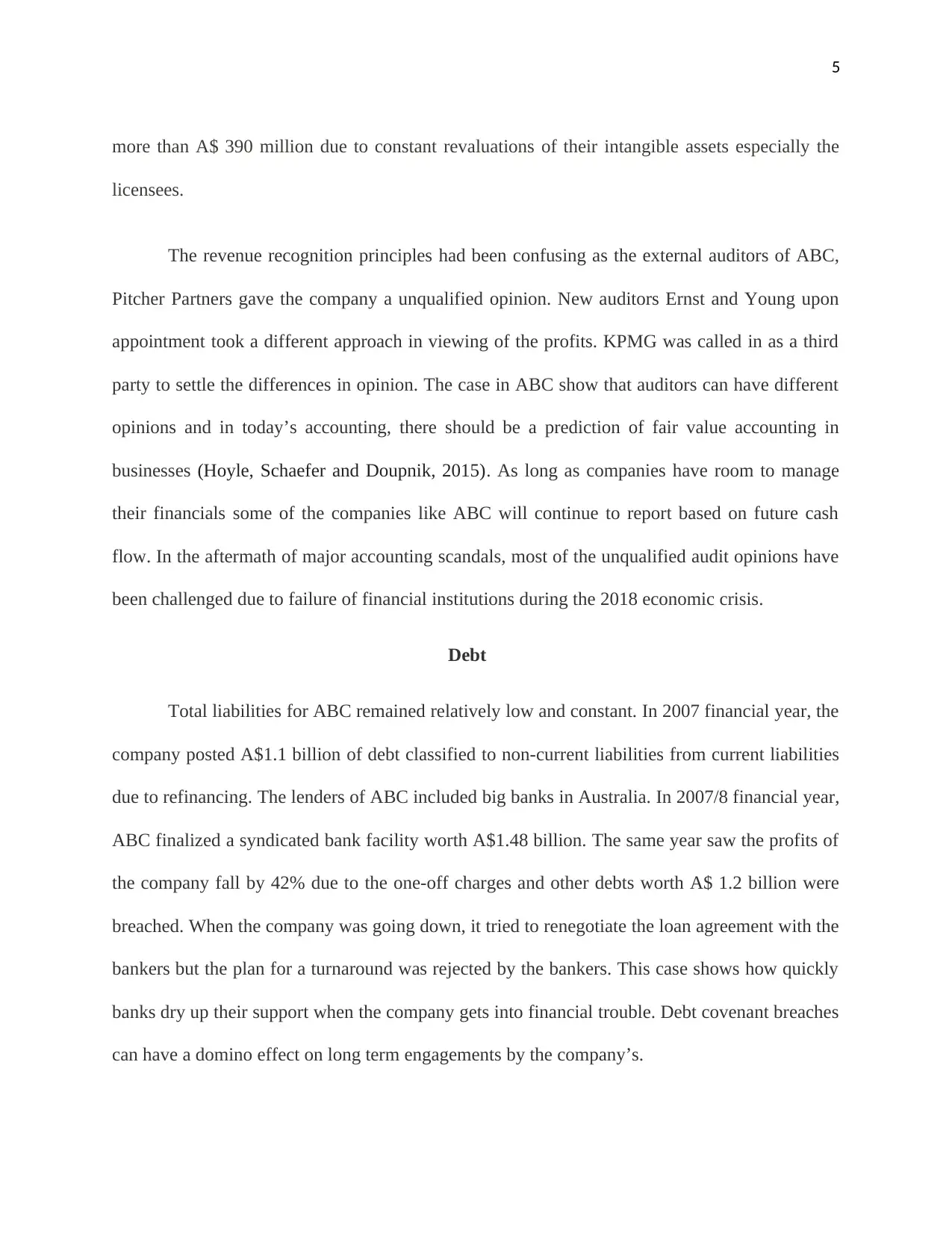
5
more than A$ 390 million due to constant revaluations of their intangible assets especially the
licensees.
The revenue recognition principles had been confusing as the external auditors of ABC,
Pitcher Partners gave the company a unqualified opinion. New auditors Ernst and Young upon
appointment took a different approach in viewing of the profits. KPMG was called in as a third
party to settle the differences in opinion. The case in ABC show that auditors can have different
opinions and in today’s accounting, there should be a prediction of fair value accounting in
businesses (Hoyle, Schaefer and Doupnik, 2015). As long as companies have room to manage
their financials some of the companies like ABC will continue to report based on future cash
flow. In the aftermath of major accounting scandals, most of the unqualified audit opinions have
been challenged due to failure of financial institutions during the 2018 economic crisis.
Debt
Total liabilities for ABC remained relatively low and constant. In 2007 financial year, the
company posted A$1.1 billion of debt classified to non-current liabilities from current liabilities
due to refinancing. The lenders of ABC included big banks in Australia. In 2007/8 financial year,
ABC finalized a syndicated bank facility worth A$1.48 billion. The same year saw the profits of
the company fall by 42% due to the one-off charges and other debts worth A$ 1.2 billion were
breached. When the company was going down, it tried to renegotiate the loan agreement with the
bankers but the plan for a turnaround was rejected by the bankers. This case shows how quickly
banks dry up their support when the company gets into financial trouble. Debt covenant breaches
can have a domino effect on long term engagements by the company’s.
more than A$ 390 million due to constant revaluations of their intangible assets especially the
licensees.
The revenue recognition principles had been confusing as the external auditors of ABC,
Pitcher Partners gave the company a unqualified opinion. New auditors Ernst and Young upon
appointment took a different approach in viewing of the profits. KPMG was called in as a third
party to settle the differences in opinion. The case in ABC show that auditors can have different
opinions and in today’s accounting, there should be a prediction of fair value accounting in
businesses (Hoyle, Schaefer and Doupnik, 2015). As long as companies have room to manage
their financials some of the companies like ABC will continue to report based on future cash
flow. In the aftermath of major accounting scandals, most of the unqualified audit opinions have
been challenged due to failure of financial institutions during the 2018 economic crisis.
Debt
Total liabilities for ABC remained relatively low and constant. In 2007 financial year, the
company posted A$1.1 billion of debt classified to non-current liabilities from current liabilities
due to refinancing. The lenders of ABC included big banks in Australia. In 2007/8 financial year,
ABC finalized a syndicated bank facility worth A$1.48 billion. The same year saw the profits of
the company fall by 42% due to the one-off charges and other debts worth A$ 1.2 billion were
breached. When the company was going down, it tried to renegotiate the loan agreement with the
bankers but the plan for a turnaround was rejected by the bankers. This case shows how quickly
banks dry up their support when the company gets into financial trouble. Debt covenant breaches
can have a domino effect on long term engagements by the company’s.
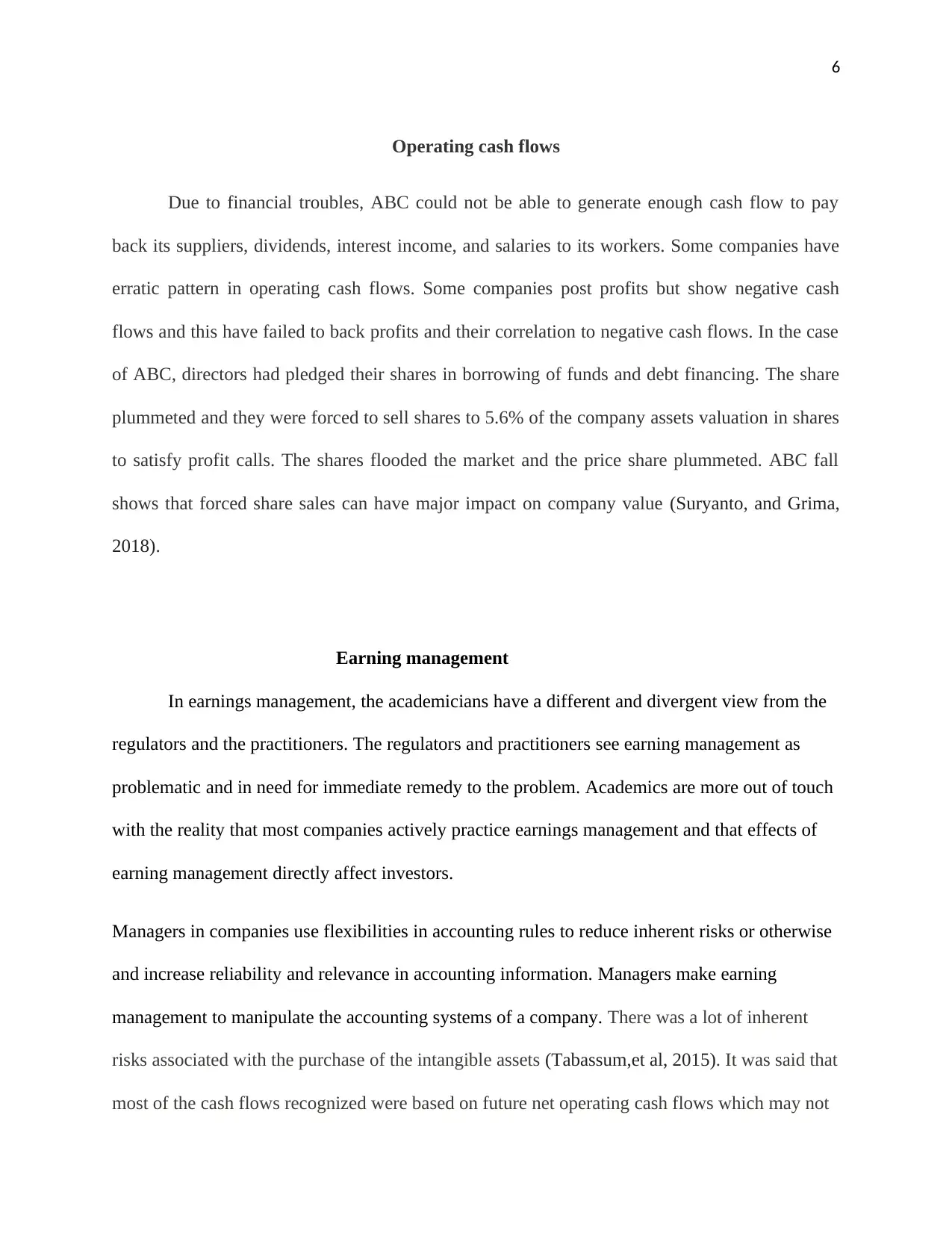
6
Operating cash flows
Due to financial troubles, ABC could not be able to generate enough cash flow to pay
back its suppliers, dividends, interest income, and salaries to its workers. Some companies have
erratic pattern in operating cash flows. Some companies post profits but show negative cash
flows and this have failed to back profits and their correlation to negative cash flows. In the case
of ABC, directors had pledged their shares in borrowing of funds and debt financing. The share
plummeted and they were forced to sell shares to 5.6% of the company assets valuation in shares
to satisfy profit calls. The shares flooded the market and the price share plummeted. ABC fall
shows that forced share sales can have major impact on company value (Suryanto, and Grima,
2018).
Earning management
In earnings management, the academicians have a different and divergent view from the
regulators and the practitioners. The regulators and practitioners see earning management as
problematic and in need for immediate remedy to the problem. Academics are more out of touch
with the reality that most companies actively practice earnings management and that effects of
earning management directly affect investors.
Managers in companies use flexibilities in accounting rules to reduce inherent risks or otherwise
and increase reliability and relevance in accounting information. Managers make earning
management to manipulate the accounting systems of a company. There was a lot of inherent
risks associated with the purchase of the intangible assets (Tabassum,et al, 2015). It was said that
most of the cash flows recognized were based on future net operating cash flows which may not
Operating cash flows
Due to financial troubles, ABC could not be able to generate enough cash flow to pay
back its suppliers, dividends, interest income, and salaries to its workers. Some companies have
erratic pattern in operating cash flows. Some companies post profits but show negative cash
flows and this have failed to back profits and their correlation to negative cash flows. In the case
of ABC, directors had pledged their shares in borrowing of funds and debt financing. The share
plummeted and they were forced to sell shares to 5.6% of the company assets valuation in shares
to satisfy profit calls. The shares flooded the market and the price share plummeted. ABC fall
shows that forced share sales can have major impact on company value (Suryanto, and Grima,
2018).
Earning management
In earnings management, the academicians have a different and divergent view from the
regulators and the practitioners. The regulators and practitioners see earning management as
problematic and in need for immediate remedy to the problem. Academics are more out of touch
with the reality that most companies actively practice earnings management and that effects of
earning management directly affect investors.
Managers in companies use flexibilities in accounting rules to reduce inherent risks or otherwise
and increase reliability and relevance in accounting information. Managers make earning
management to manipulate the accounting systems of a company. There was a lot of inherent
risks associated with the purchase of the intangible assets (Tabassum,et al, 2015). It was said that
most of the cash flows recognized were based on future net operating cash flows which may not
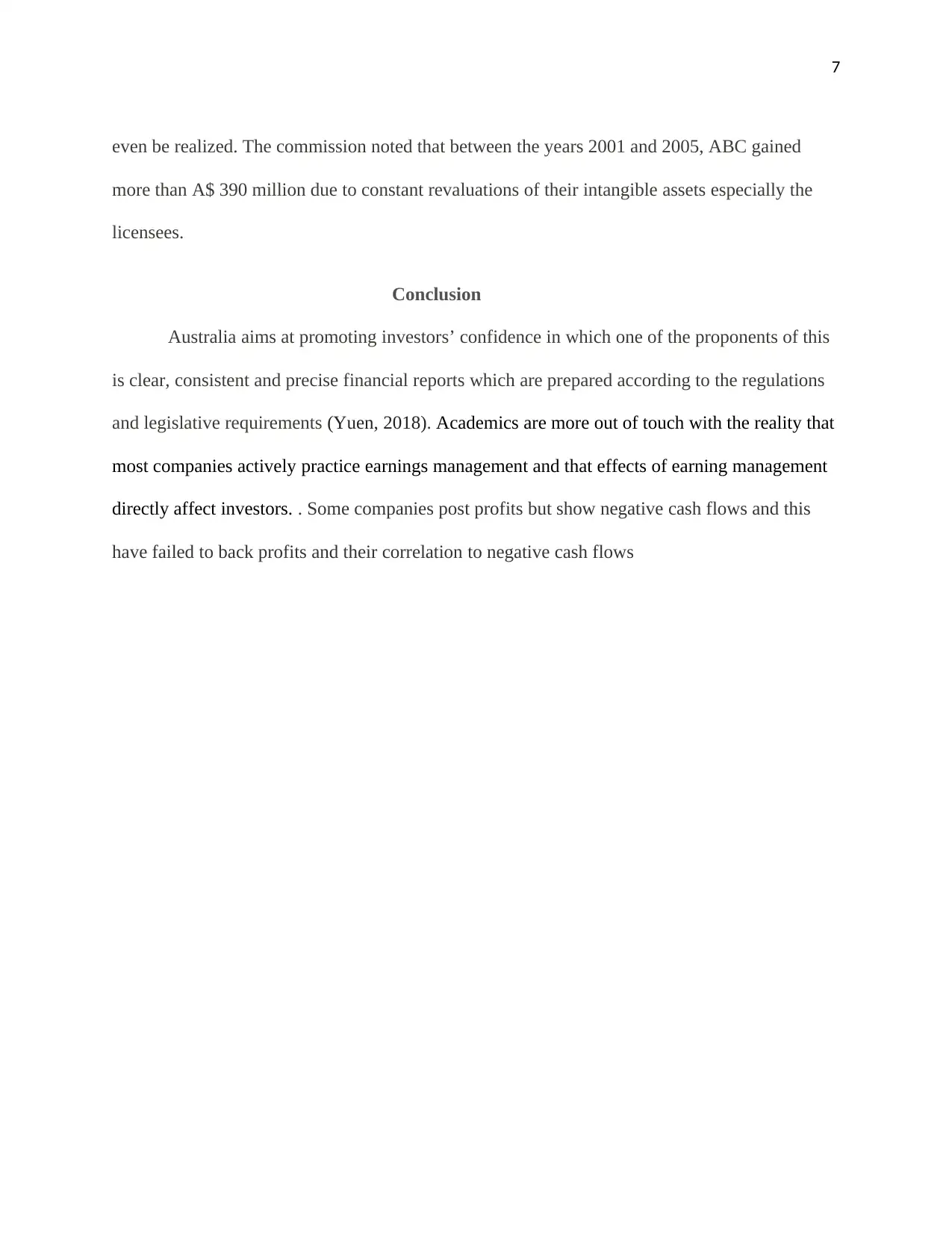
7
even be realized. The commission noted that between the years 2001 and 2005, ABC gained
more than A$ 390 million due to constant revaluations of their intangible assets especially the
licensees.
Conclusion
Australia aims at promoting investors’ confidence in which one of the proponents of this
is clear, consistent and precise financial reports which are prepared according to the regulations
and legislative requirements (Yuen, 2018). Academics are more out of touch with the reality that
most companies actively practice earnings management and that effects of earning management
directly affect investors. . Some companies post profits but show negative cash flows and this
have failed to back profits and their correlation to negative cash flows
even be realized. The commission noted that between the years 2001 and 2005, ABC gained
more than A$ 390 million due to constant revaluations of their intangible assets especially the
licensees.
Conclusion
Australia aims at promoting investors’ confidence in which one of the proponents of this
is clear, consistent and precise financial reports which are prepared according to the regulations
and legislative requirements (Yuen, 2018). Academics are more out of touch with the reality that
most companies actively practice earnings management and that effects of earning management
directly affect investors. . Some companies post profits but show negative cash flows and this
have failed to back profits and their correlation to negative cash flows
Paraphrase This Document
Need a fresh take? Get an instant paraphrase of this document with our AI Paraphraser
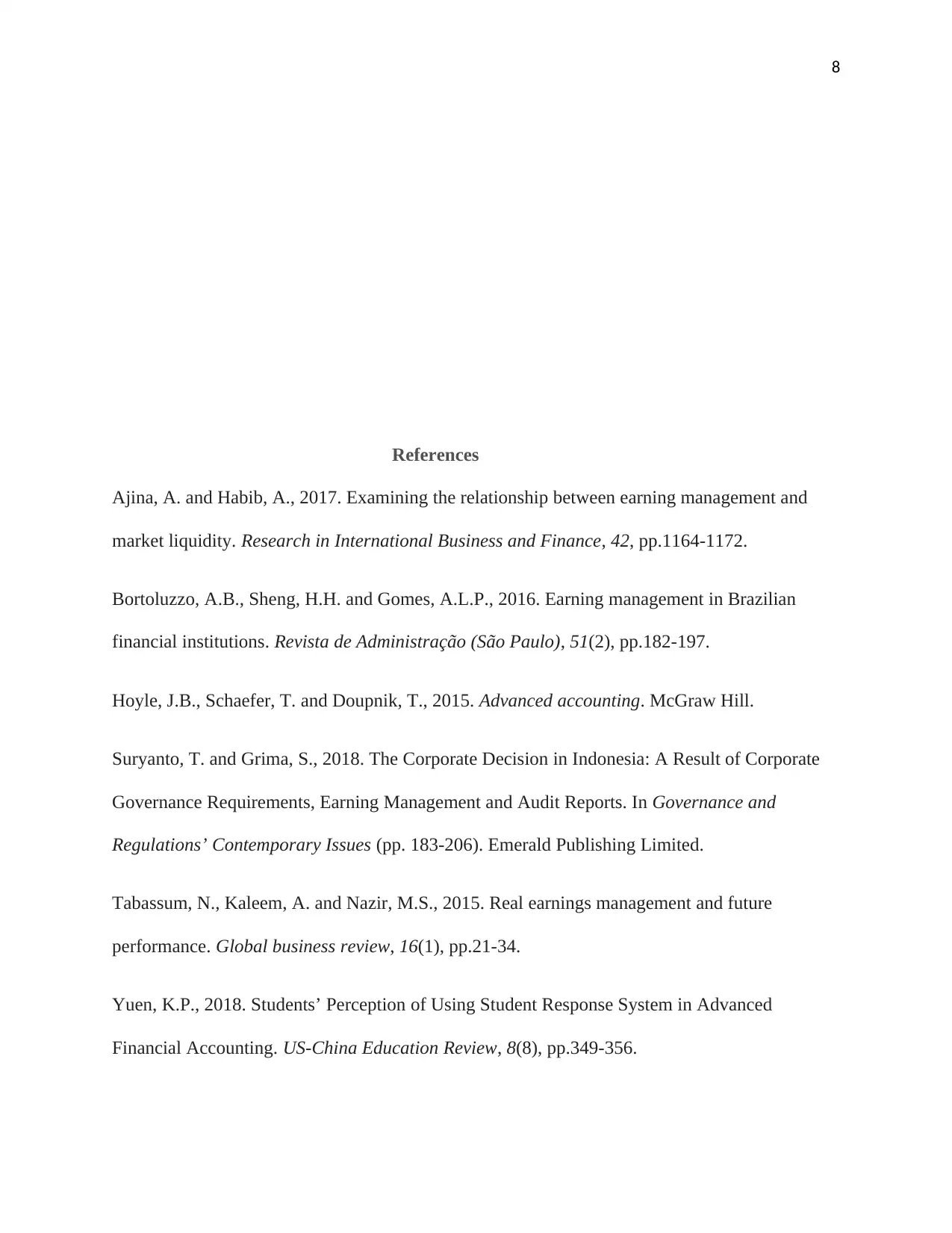
8
References
Ajina, A. and Habib, A., 2017. Examining the relationship between earning management and
market liquidity. Research in International Business and Finance, 42, pp.1164-1172.
Bortoluzzo, A.B., Sheng, H.H. and Gomes, A.L.P., 2016. Earning management in Brazilian
financial institutions. Revista de Administração (São Paulo), 51(2), pp.182-197.
Hoyle, J.B., Schaefer, T. and Doupnik, T., 2015. Advanced accounting. McGraw Hill.
Suryanto, T. and Grima, S., 2018. The Corporate Decision in Indonesia: A Result of Corporate
Governance Requirements, Earning Management and Audit Reports. In Governance and
Regulations’ Contemporary Issues (pp. 183-206). Emerald Publishing Limited.
Tabassum, N., Kaleem, A. and Nazir, M.S., 2015. Real earnings management and future
performance. Global business review, 16(1), pp.21-34.
Yuen, K.P., 2018. Students’ Perception of Using Student Response System in Advanced
Financial Accounting. US-China Education Review, 8(8), pp.349-356.
References
Ajina, A. and Habib, A., 2017. Examining the relationship between earning management and
market liquidity. Research in International Business and Finance, 42, pp.1164-1172.
Bortoluzzo, A.B., Sheng, H.H. and Gomes, A.L.P., 2016. Earning management in Brazilian
financial institutions. Revista de Administração (São Paulo), 51(2), pp.182-197.
Hoyle, J.B., Schaefer, T. and Doupnik, T., 2015. Advanced accounting. McGraw Hill.
Suryanto, T. and Grima, S., 2018. The Corporate Decision in Indonesia: A Result of Corporate
Governance Requirements, Earning Management and Audit Reports. In Governance and
Regulations’ Contemporary Issues (pp. 183-206). Emerald Publishing Limited.
Tabassum, N., Kaleem, A. and Nazir, M.S., 2015. Real earnings management and future
performance. Global business review, 16(1), pp.21-34.
Yuen, K.P., 2018. Students’ Perception of Using Student Response System in Advanced
Financial Accounting. US-China Education Review, 8(8), pp.349-356.

9
1 out of 9
Your All-in-One AI-Powered Toolkit for Academic Success.
+13062052269
info@desklib.com
Available 24*7 on WhatsApp / Email
![[object Object]](/_next/static/media/star-bottom.7253800d.svg)
Unlock your academic potential
© 2024 | Zucol Services PVT LTD | All rights reserved.





